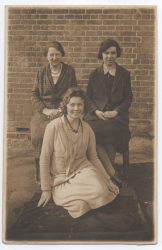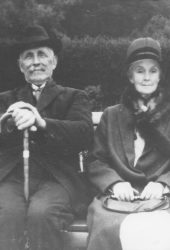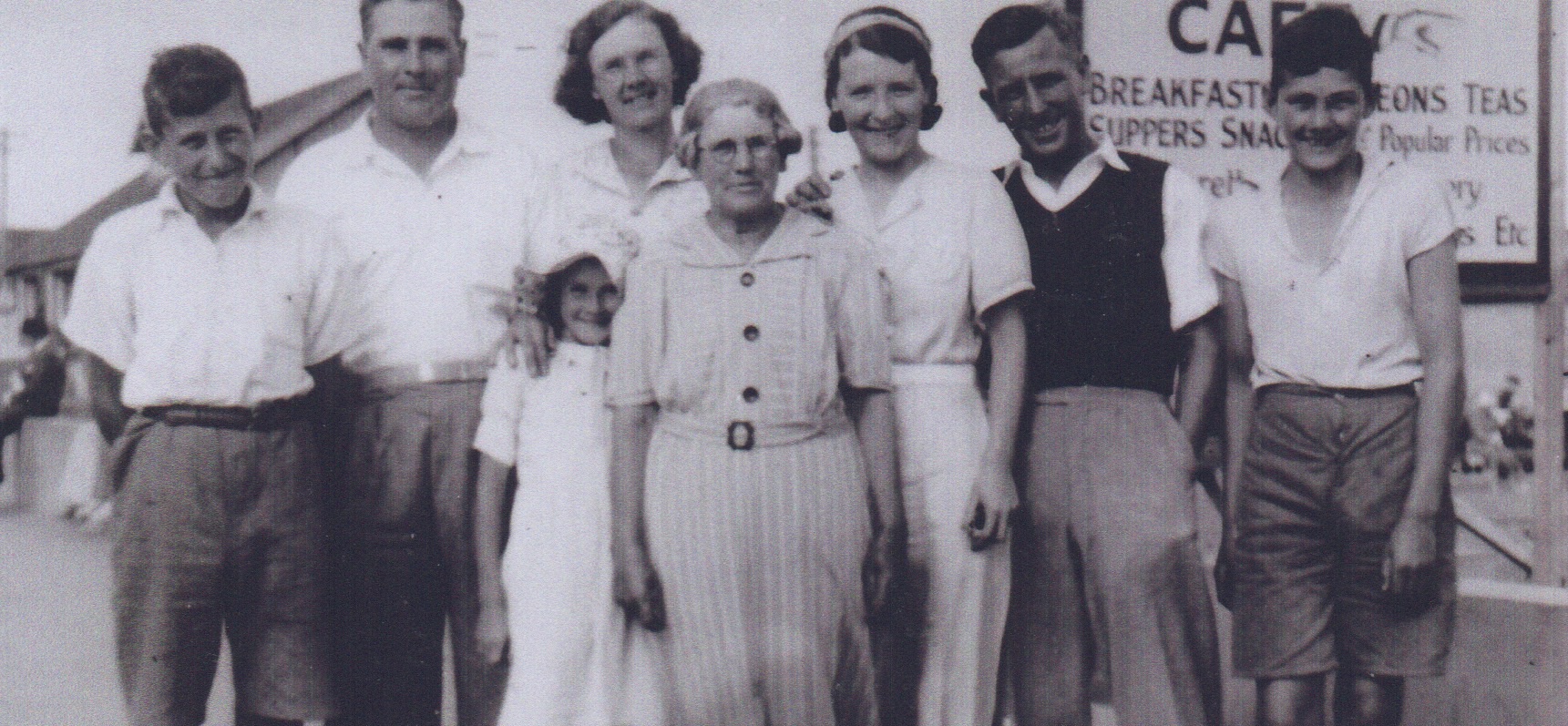(Pictured above: Dot and Charlie Rogers with sons Leonard and Bryan and daughter Gwen. Dot’s mother “Nan-Nan” Rush. Mr and Mrs Jim Archer, friends from Saffron Walden. On holiday in Frinton, last week of August 1939 just before WWII was declared.)
Who am I?
I was born in Chrishall, but I’m not sure where!
It never occurred to me to ask; my mother sometimes spoke, wistfully, about ‘The Butts’, the house in Church Road, opposite the end of Chalky Lane. I think my parents lived there when they were first married, and probably my elder brother was born there. Then I think they lived in one of the council houses in the High Street, so I might have been born there. However, I have vague a recollection of us moving into the flint cottage down the lane, Hogs Lane or Red Cow Lane, which was then nothing more than a cart track.
 My father went to work on a motorbike and my brother and I went to the local school where Miss Rose Hile was headmistress. (Left: Miss Hile, Mrs Patmore and Miss White) She lived in the schoolhouse with her elderly father. Miss Connie George taught the infants. She married Mr. Patmore, from Arkesden, who sadly died soon after they were married. She came back to teach as Mrs Patmore and lived with Mr and Mrs Rush who ran the garage, selling petrol, paraffin, bicycle spares etc. and charging wireless accumulators.
My father went to work on a motorbike and my brother and I went to the local school where Miss Rose Hile was headmistress. (Left: Miss Hile, Mrs Patmore and Miss White) She lived in the schoolhouse with her elderly father. Miss Connie George taught the infants. She married Mr. Patmore, from Arkesden, who sadly died soon after they were married. She came back to teach as Mrs Patmore and lived with Mr and Mrs Rush who ran the garage, selling petrol, paraffin, bicycle spares etc. and charging wireless accumulators.
There was no mains electricity in the village until about 1948, and, even worse no mains water, until the mid 30’s. Before that we obtained drinking water from the village pump, the picture of which adorns the front cover of Irene Cranwell’s publication, ‘Chrishall Folk’ showing ‘Aunt Jessie Ives’ drawing water. She used to clean the schoolrooms after the children had left. The pump was condemned, and the water declared unfit to drink. Some people had their own wells but for the rest galvanised tanks were set up at strategic points and water was delivered by tankers, not very nice in hot weather! Most people used rainwater for other uses.
Schooldays then were carefree, in summer we roamed and played freely and in winter it seemed as though the ponds always froze and as soon as the word went around that this or that, pond was ‘bearing’ we would be sliding on the ice, only coming home when we were hungry.

Albert and Alice Rogers, Home Farm – Bryan’s Grandparents
Some of us were able to work, after school or in the holidays. I was lucky in that one of my grandfathers was a farmer and I was allowed to help with the cows or the sheep, or in the fields at harvest time or hoeing sugarbeet. The work was done with horses, of which there were three, Punch, Gilbert and Betty plus grandad’s pony. One by one they had to be taken to Duddenhoe End to be shod by the blacksmith, Mr Charlie Blyth. One of my uncles, three of whom worked on the farm, came up with a riding saddle and I was allowed to ride Betty, alone to the smithy.
My great uncle was a builder, he had two sons, one was a bricklayer, the other a carpenter and I spent many hours in the workshop with them and even on a building site. I wanted to be a carpenter but I became an engineer instead.
War was declared! We were on our one and only family holiday, (see main picture) Mum, Dad, my brother and I, my little sister and my grandmother, who we called Nan-nan, in a little wooden bungalow in Jaywick Sands. It was the last week of August 1939 and because there was only one family there who had a wireless set a crowd would gather outside their bungalow every night to hear the nine o’clock news. We arrived home on the Saturday to find the village invaded by evacuees from Bruce Grove, Tottenham. School was never the same, we were segregated, the girls stayed at the school and the boys had to meet in the Chapel Vestry. Integration took a little while, they thought we were all stupid and slow-witted and we didn’t know what to make of them, but friendships soon formed and most of them adapted to country life.
Children then left school at 14 unless they gained a scholarship to attend the Newport Grammar School or later, the Cambridgeshire Technical School, which I was fortunate to achieve and joined my good friend Roy Loveday, who had preceded me by one year. We cycled each day to Fowlmere, where we left our bikes in a lady’s garden, and caught the bus which came from Barley, or Barkway and discharged us at the church, known as ‘The Cathedral’, from where we walked to Collier Rd., off Mill Rd., and, of course, made the return journey later.
After two years, learning engineering, I began work at Trumpington with a company who had moved out of London and set up in the grounds of two large houses at the top end of Long Road. The company, Messrs. Block and Anderson, made spirit duplicators and later early forms of calculators.
I cycled to work on Monday morning and after work cycled into Cambridge where I lodged with Harry and Vera Clarke (nee Drury), he being the son of Charles and Ellen Clarke. We worked a five and a half day week then so I would cycle home, to Chrishall, at Saturday lunch time.
I continued my education by attending evening classes and day-release at the ‘Tech’ then, as soon as I was old enough I followed my brother by joining the Royal Navy, arriving at Butlins Holiday Camp in Skegness which had become HMS Royal Arthur, known as a Stone Frigate. From there I progressed through a fairly tough training course, ending up as a qualified Electrical Mechanic and fortunately for me, by then the war was over and I joined the aircraft carrier HMS Victorious at Devonport and eventually set sail for the Far East, calling at many interesting places en route.


0 Comments